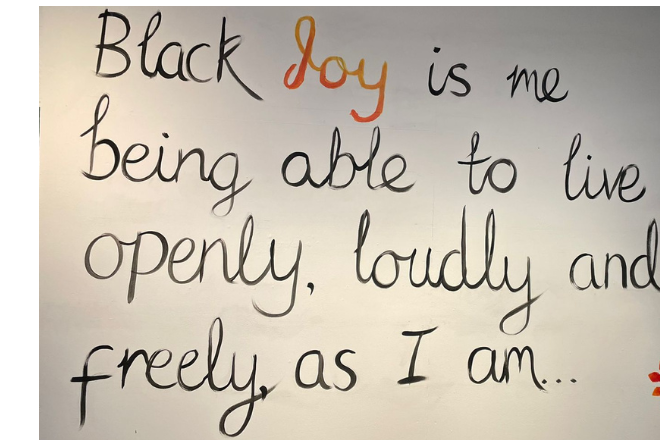As a long-term associate of the Co-production Network for Wales, Mike Corcoran supported the development of the Network’s ‘Measuring What Matters’ thinking tool, and the Welsh Council for Voluntary Action's 'Simple Questions' evaluation framework. In this guest blog, Mike explains how a passion for co-production coupled with a growing interest in evaluation lead him to the world of 'co-evaluation'.
.jpg)
In recent years, more and more of my time has been dedicated to thinking about, talking about, and getting stuck into evaluation (collecting, reflecting on and assessing information about something, in order to understand, improve and evidence). For full disclosure, I've never really considered myself an evaluation expert: I always work as part of a team, learn from the great example of those around me, and do my best to follow the guidance and good practice that has been shared by a never-growing (and ever supportive) international community of evaluation practitioners.
My growing interest in evaluation has really been a natural on sequence of my passion for co-production. I care about people, I care about communities, and I want people and communities to have power and responsibility over the things which matter to them, growing together, and empowered by the systems and services which support them. This naturally leads me to reflect on all sorts of questions … Is this working? How is it making people feel? What's changing? How could things be better for everyone? In searching for ways to answer questions like these, evaluation has become an increasingly important part of my professional life.
But there's more to it than that. For me, the magic really happens when those principles that characterise good evaluation, come face-to-face with those values that characterise good co-production – the world of 'co-evaluation'. What does evaluation look like when we do it with our communities, not for or to them? What do evaluators look like when they transition from being the expert providers of a service, to the facilitators of a collective endeavour? As with all flavours of co-production, co-evaluation brings with it some considerable challenges, but these are far outweighed by the opportunities to gain insights, and achieve impacts, which just wouldn't be possible in any other way.
If there's one simple ready-made way to co-evaluate, I'm yet to find it, but below are ten broad lessons which have certainly helped me on my journey so far, and which I hope can do the same for you. (Whilst there's no silver bullet, Evaluation Support Scotland's guide 'How to evaluate asset-based approaches in an asset-based way' is a great starting point.)
1. People are not data points
As co-evaluators we are primarily interested not in data, but in people. Behind every statistic, and every point on a graph, is a person, with a life, a family, values, beliefs, and a rich lived experience. We forget this at our peril. The way we gather, interpret and present data, should respect the people, and the stories, behind every data point.
2. We can (and should) positively disrupt our results
When we ask people to share their thoughts, feelings and experiences with us, that very act has an impact upon them. Equally, when we fail to give people those opportunities to share, that lack of an act has an impact upon them. As co-evaluators, we are not passive observers. Our evaluations will have an impact upon all those we choose to involve, and all those we choose not to. We must acknowledge this, and do our best to ensure we bring positive experiences to our communities through our activities, and enhance the impacts of those services we evaluate.
3. You cannot separate the evaluation from the service
Evaluation is not 'the thing you do at the end'. For any service or programme which is co-produced (or any which aspires to be),regular opportunities to share, reflect, learn and develop together are absolutely critical to the process. Co-evaluation therefore, is not an optional extra, but integral to making it all work.
4. We should co-evaluate when environments are complex
When processes are linear, solutions are well documented and there's no room for debate, we can call in the ‘experts’. But when processes are complex, we are faced with 'wicked problems', the future is uncertain and solutions must be discovered or created as we go along, co-production is imperative. As co-evaluators, we can add the greatest value, and involve our communities in the most meaningful ways, when our concern is those areas of greatest complexity.
5. We should co-evaluate when we want to improve (not just prove)
Evaluation is about more than 'proving we did what we said we'd do'. As co-evaluators, our primary focus should not be on proving, but improving: it is this focus on the future which creates the greatest scope to involve our communities in ways which will be meaningful and rewarding to them, and which supports the continued enhancement of the impacts our services can deliver.
6. We should co-evaluate when it will make people feel good
If you can't decide whether or not co-evaluation is the way, ask yourself– how will the experience make people feel? If there's good reason to believe evaluating with you will make people in your community feel happy and valued, then co-evaluate – what more reason do you need?!
7. Co-evaluation should be the rule, not the exception
If we look across the breadth of our work, and seek out those prime opportunities to co-evaluate, we will always run the risk of letting something slip through the net. If, however, our starting assumption is that all evaluation should be co-evaluation, and we only retain power and responsibility where there is a clear and demonstrable need to, we will never miss an opportunity to make a difference.
8. Lack of certainty is not lack of a plan
A common concern regarding co-evaluation is that 'it cannot give our funders the clarity they need'. It is true that a co-evaluation approach may entail being agnostic as to the questions you will ask, the methods you will employ in asking them, or the outcomes and impacts you will assess when you embark on the journey. But that is not the same as having no plan. As co-evaluators, we are committed to our values, our respect for our communities, our ways of working. We can give confidence to our funders and sponsors that through sharing power and responsibility for evaluation with our communities, we will ultimately achieve more than we ever could alone.
9. High-quality evidence doesn’t mean a low-quality experience
It can be tempting to think that, for an evaluation to be robust, provide data of quality and to be 'taken seriously' that it must be austere. But academic language, unimaginative documents, and dispassionate conversations do not enhance the standard of our evidence. We can simultaneously be warm, friendly, flexible and creative, whilst compiling evidence of the highest quality – in fact, we owe it to our communities to be so.
10. Start from where you are!
The journey from evaluation to co-evaluation (or from no evaluation to co-evaluation!) will take time. There is no 'right way to do it' and no 'right place to start from'. Start from wherever you are, and begin with the simple things which can make a difference. Weeks, months and years from now, when you look back, you won't believe how far you've come!
Photo credit: cover illustration by Upklyak





.png)

.png)
.png)


.png)
.png)
.png)